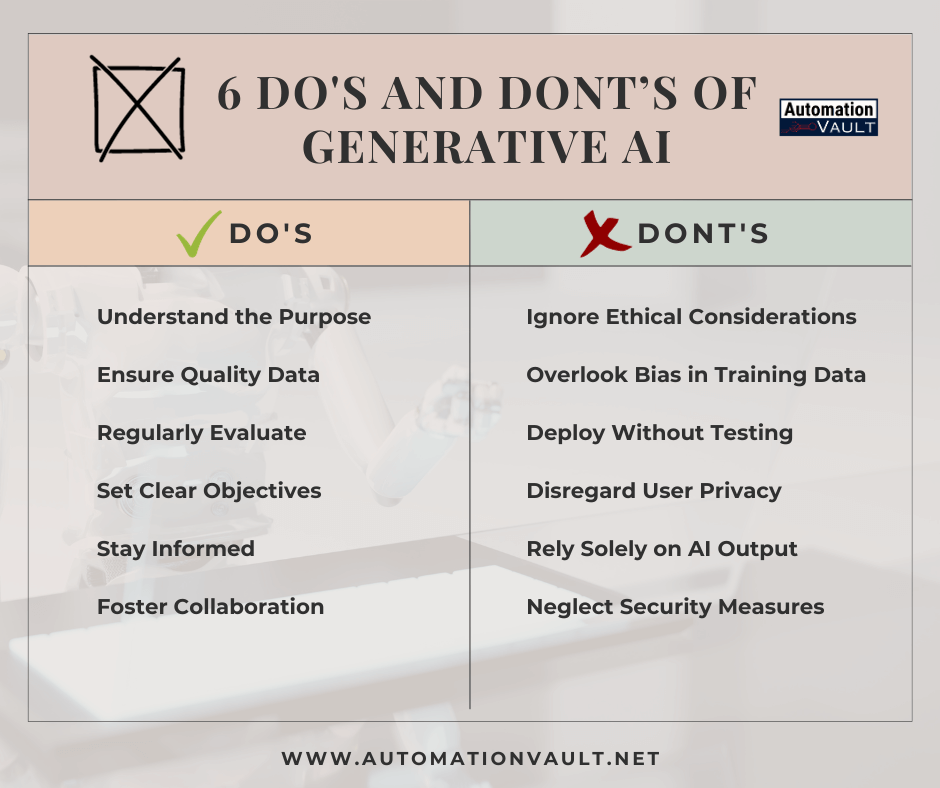Generative Artificial Intelligence (Generative AI) holds immense potential, but responsible use is paramount. Let’s delve into the dos and don’ts to navigate the generative AI landscape wisely.

Dos of Genetive AI:
- Understand the Purpose: Clearly define the goals and applications of Generative AI to align with ethical standards.
- Before embarking on any Generative AI project, it’s crucial to have a comprehensive understanding of its purpose. Clearly defining goals helps in maintaining transparency and ensuring that the application adheres to ethical standards. This step forms the foundation for responsible AI development.
- Ensure Quality Data: Start with high-quality, diverse datasets to train the model effectively.
- The quality of data used for training directly influences the performance of the AI model. Initiating the process with diverse and high-quality datasets ensures that the model learns from a representative sample, improving its accuracy and reliability.
- Regularly Evaluate: Implement continuous evaluation of the AI model’s performance.
- The AI landscape is dynamic, and user expectations can change over time. Regular evaluation of the model’s performance ensures that it remains effective and aligned with user needs. Continuous improvement based on feedback is essential for keeping the AI system relevant.
- Set Clear Objectives: Establish specific objectives for the AI system to avoid unintended consequences.
- Clear objectives serve as a guide for AI development. By defining specific goals, developers can steer the model away from unintended consequences and ensure that its output aligns with the broader objectives of the application.
- Stay Informed: Keep abreast of advancements and ethical considerations in AI.
- The field of AI is rapidly evolving. Staying informed about the latest advancements and ethical considerations is essential for responsible AI development. This includes attending conferences, reading research papers, and actively participating in AI communities.
- Foster Collaboration: Encourage interdisciplinary collaboration between AI experts, ethicists, and industry specialists.
- Collaboration is key to responsible AI development. Bringing together experts from various fields ensures a holistic approach, considering not only technical aspects but also ethical considerations and industry-specific requirements.
Don’ts of Generative AI:
- Ignore Ethical Considerations: Avoid deploying AI systems that may cause harm or perpetuate biases.
- Ignoring ethical considerations can lead to the deployment of AI systems with unintended consequences. Responsible AI development involves prioritizing ethical guidelines and avoiding innovations that may have negative societal impacts.
- Overlook Bias in Training Data: Scrutinize training datasets for biases and rectify imbalances.
- Bias in training data can result in discriminatory AI outcomes. Thoroughly examining and addressing biases in the dataset is crucial for creating fair and unbiased AI systems.
- Deploy Without Testing: Thoroughly test AI models in various scenarios before deployment.
- Rushing the deployment process without comprehensive testing can lead to unreliable AI systems. Thorough testing ensures that the model performs accurately across different scenarios, reducing the risk of unexpected behaviors.
- Disregard User Privacy: Prioritize user privacy and data protection.
- Protecting user privacy is a fundamental aspect of responsible AI development. Disregarding privacy measures can lead to breaches and erode user trust. Prioritizing robust privacy measures is essential, especially when dealing with sensitive information.
- Rely Solely on AI Output: Maintain a human-in-the-loop approach to oversee AI-generated content.
- Humans provide critical oversight in AI systems. Relying solely on AI decisions, especially in critical contexts, can lead to errors. A human-in-the-loop approach ensures that human judgment complements and validates AI-generated content.
- Neglect Security Measures: Implement strong security protocols to safeguard AI models from malicious attacks.
- AI models are susceptible to security threats. Neglecting security measures can expose models to malicious attacks, compromising their integrity. Regularly updating security protocols is essential for protecting AI systems from emerging threats.
Conclusion: Navigating the world of Generative AI demands a delicate balance between innovation and responsibility. By adhering to these dos and don’ts, we can harness the power of AI while mitigating potential risks and ensuring a positive impact on society.
Remember: Responsible AI is smart AI.


Leave a Reply